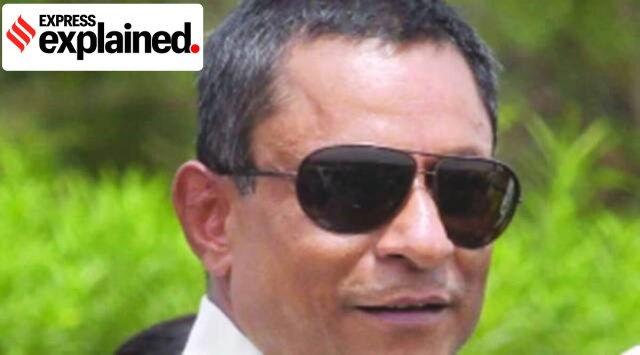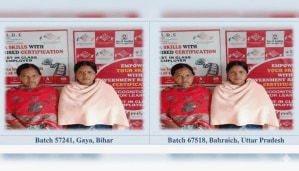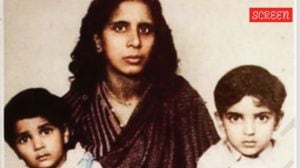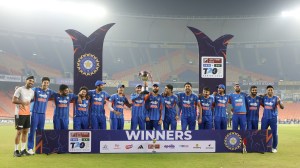Delhi HC rejects Ishrat Jahan probe officer’s plea against dismissal: ‘Tough’ cop’s many run-ins with govt
Satish Chandra Verma, an IIT Delhi graduate and 1986 batch IPS officer, was part of the SIT that said the shooting of Ishrat Jahan and three others was a 'premeditated custodial killing'.
 In 2002, after the Gujarat riots, Verma was transferred to Ahmedabad to take charge of the worst-hit areas of Naroda Patiya, Naroda Gam and Gulberg Society. (File)
In 2002, after the Gujarat riots, Verma was transferred to Ahmedabad to take charge of the worst-hit areas of Naroda Patiya, Naroda Gam and Gulberg Society. (File) The Delhi High Court on Wednesday dismissed a petition by Gujarat IPS officer Satish Chandra Verma challenging his dismissal from service. Verma was dismissed in August last year, a month before his superannuation, over “unauthorised” comments to the media on the 2004 alleged fake encounter of Ishrat Jahan.
In his tenure, the 1986 batch Indian Police Service (IPS) officer had several run-ins with the Gujarat government and the Centre.
An IIT Delhi graduate who hails from Bihar, Verma first made news in 1998 when he, along with Gujarat-cadre IPS officers Atul Karwal and the late P K Jha, was accused of assaulting then BJP MLA and lawyer Yatin Oza during a protest in Ahmedabad
In 2002, when the state was smouldering after the riots, Verma was transferred to Ahmedabad to take charge of the worst-hit areas of Naroda Patiya, Naroda Gam and Gulberg Society as part of a reshuffle by former Punjab Police chief K P S Gill, who was brought in to control the violence. By then, Verma was known as a “tough cop” who took on the gangs of Porbandar in the early 90s.
In 2005-2006, Verma was transferred to a Special Reserve Police Training Centre in Junagadh, in what was considered a “punishment posting”, soon after he ordered the arrest of then BJP MLA Shankar Chaudhary in a 2002 riot case in which two Muslim youths were killed. As DIG (Border Range) at the time, he had been inducted into a committee set up at the direction of the Supreme Court to review closed riot cases.
In 2010-11, Verma had his biggest run-in with the Narendra Modi-led state government following the killing of Ishrat Jahan. He was part of the SIT constituted by the Gujarat High Court to look into the encounter, and it held that the shootout in which Jahan and three others were killed was a “premeditated” custodial killing. In November 2011, Verma filed an affidavit in the court stating that several witnesses were being forced to retract their testimonies.
Based on the SIT’s report, the High Court entrusted the investigation of the case to the CBI in December 2011, directing that it should avail of Verma’s services.
In June 2012, Verma approached the High Court saying the state government had ordered an inquiry against him headed by then Vadodara Police Commissioner Rakesh Asthana (whose last posting was as Delhi Police Commissioner), for seizing a hard disk from a forensic lab containing evidence pertaining to the Ishrat Jahan encounter which, he said, had been concealed by the lab till then.
By then, Verma had been transferred from his posting as Joint Commissioner, Traffic, to the Junagadh Police Training Centre again.
In 2013, on the basis of the SIT and then the CBI’s probe, four IPS officers were chargesheeted – PP Pandey, DG Vanzara, GL Singhal from the Gujarat cadre, and Intelligence Officer Rajinder Kumar.
In 2016, a special CBI court granted Verma permission to get a certified copy of the first chargesheet in the case, after he pleaded that he believed “a serious and concerted attempt is being made to cause miscarriage of justice, by attempting to negate or weaken the evidences collected in the investigation”. The CBI appealed against the order before the High Court, which overturned the CBI court’s ruling.
In 2012, when he was probing the Ishrat Jahan case, a police encounter case during his period as Porbandar SP, of Jasu Gagan Shiyal in 1996, was revived after the Gujarat High Court directed its re-opening. In October 2013, the Supreme Court stayed Verma’s arrest in this even as the investigation continued.
In 2014, Verma was posted as Chief Vigilance Officer in North Eastern Electric Power Corporation (NEEPCO), Shillong, a Central Public Sector Enterprises under the Ministry of Power.
During his 2014-2016 tenure at NEEPCO, too, Verma ran foul of the government, as he alleged financial and administrative irregularities and improprieties against the management of NEEPCO, which also pointed fingers at the then junior Home minister Kiren Rijiju.
In his time at NEEPCO, Verma faced at least three more charge memos issued by the Union government – in May 2016 for violating service rules, on charges of misconduct and unauthorised leave; August 2018 over a media interview; and in September 2018 for alleged delay in dispatching Vigilance reports.
Verma challenged all these departmental chargesheets before the Central Administrative Tribunal (CAT).
In 2015, Verma was superseded even as the rest of his batch mates were promoted as Additional DGP.
Last year, after the Delhi High Court allowed his dismissal, Verma moved the Supreme Court. In his petition, he claimed he was in the process of filing more reports with respect to Vigilance investigations in NEEPCO when the Appointments Committee of the Cabinet in July 2016 issued orders curtailing his tenure and transferred him laterally to the CRPF. He said this was “intended to prevent / obstruct the dispatch of (his) reports”.
Verma was eventually transferred to the post of Principal / IGP, Central Training College, CRPF, Coimbatore, in October 2017.
The dismissal order was issued against Verma on August 30, a month ahead of his superannuation. It can mean the loss of retirement benefits for him, as well as disqualifying him for any future employment with the government.
In its dismissal order, the Centre charged him with giving statements to media on the Ishrat Jahan encounter in 2016, stating that he “spoke unauthorizsedly on the matters which were not within the sphere of his duties at NEEPCO”. The Centre said such statements by him “had the effect of an adverse criticism of action of the Central Government and the State Government, which is capable of embarrassing the relations between the Central Government and the State Government, and which is also capable of affecting the relationship of India with a neighbouring country”.
The SC had in September last year granted a week’s stay on the dismissal order, making it clear that after a week, it would be up to the Delhi High Court to decide whether or not to continue with the stay.
- 01
- 02
- 03
- 04
- 05






































